theartsdesk in Oslo: by:Larm Festival 2012 and the Nordic Music Prize | reviews, news & interviews
theartsdesk in Oslo: by:Larm Festival 2012 and the Nordic Music Prize
theartsdesk in Oslo: by:Larm Festival 2012 and the Nordic Music Prize
All Nordic music in one place, drum legend Tony Allen - and a dash of church burning
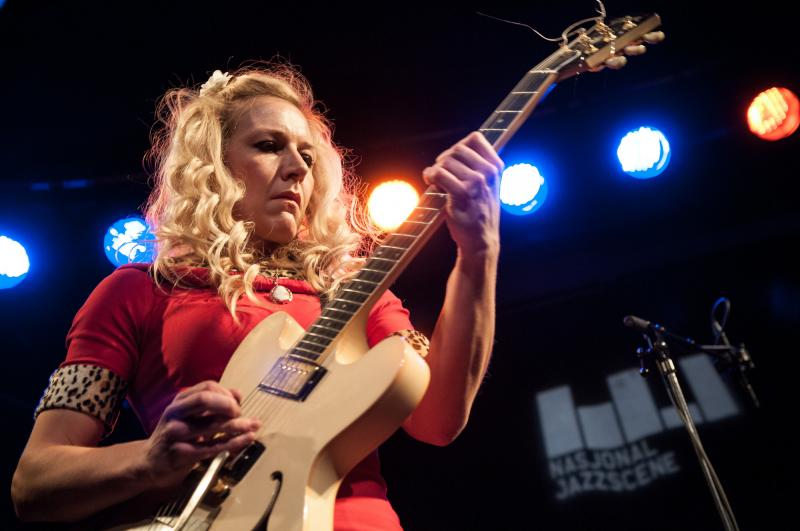
Although the four days of Norway’s 15th by:Larm Festival were dominated by the presentation of the second annual Nordic Music Prize, there were plenty of other distractions: a sobering tour of Norwegian black metal’s infamous sites, a talk by legendary Nigerian drummer Tony Allen, what felt like millions of shows in millions of venues, and weather confounding all expectations of what Oslo ought to be like in February.
Previous visits to by:Larm have involved negotiating snow three-foot deep, urban pack ice and temperatures of minus 18 centigrade. This year, the sun shone, temperatures hovered around freezing, snow was light and the pavements mostly clear. Not tropical, but rolling up at packed venues without full Arctic gear felt good.
Arriving as if dressed for an excursion to a glacier at the Nordic Music Prize wouldn’t have been on. The prize declares itself the “annual award for the best Nordic album of the year, initiated by the by:Larm conference in Norway, the most important conference and showcase event for the wider Nordic music industry”. Some level of smartness in keeping with the occasion was appropriate.
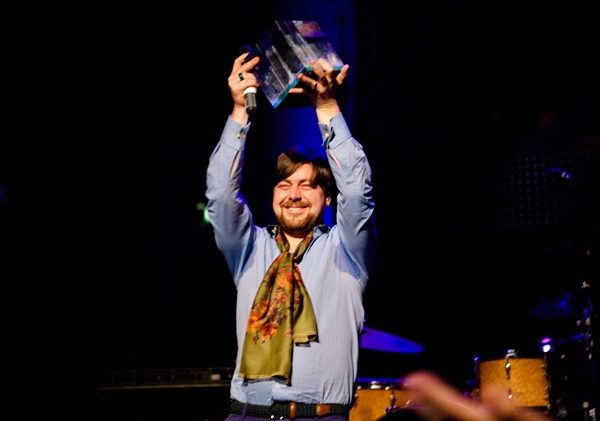 Last year, the award went to GO, the solo album by Sigur Rós’s Jónsi, a name well-known to the world beyond Scandinavia. This year’s winner was X/Y, by Sweden’s Goran Kajfes (pictured right, after being awarded the prize. Photo by Helge Brekke). The panel of mostly non-Nordic music biz wonks (one Swede and six Brits/Americans) said “a very distinctive voice unexpectedly united the jury. It’s an ambitious and warm fusion of sonic elements, from jazz with both African and eastern influences to electronica. This double album does something quite rare: it communicates the pure joy of music”.
Last year, the award went to GO, the solo album by Sigur Rós’s Jónsi, a name well-known to the world beyond Scandinavia. This year’s winner was X/Y, by Sweden’s Goran Kajfes (pictured right, after being awarded the prize. Photo by Helge Brekke). The panel of mostly non-Nordic music biz wonks (one Swede and six Brits/Americans) said “a very distinctive voice unexpectedly united the jury. It’s an ambitious and warm fusion of sonic elements, from jazz with both African and eastern influences to electronica. This double album does something quite rare: it communicates the pure joy of music”.
It’s also a wild card, kicking into a snowdrift the idea that the Nordic Music Prize was defined by last year’s safe choice. Then again, any album sporting a two-letter title might be a contender next year. As well as Björk’s Biophilia, Kajfes was up against major contenders like Ane Brun’s It All Starts With One, Lykke Li’s Wounded Rhymes and Iceage’s New Brigade. His victory showed that Finland’s krautrock-inspired weirdos Siinai, whose album Olympic Games was another nominee, really did have a chance.
Still young, the prize hasn’t reached the point where lifetime-achievement gongs are handed out. When and if that does happen, it’s moot whether Norway will want to celebrate what began in 1992, when their black metallers began burning churches. Turmoil hung thickly in the air. The following year, Varg Vikernes murdered Euronymous of seminal black metal outfit Mayhem. Vikernes had joined Mayhem in 1992. Their vocalist Dead had committed suicide in 1991. by:Larm had laid on the “True Norwegian Black Metal Tour”, a coach trip taking in some sites associated with the scene. The host was Anders Odden, formerly of the early Norwegian metal outfit Cadaver. Odden said Euronymous - Øystein Aarseth – had been his mentor, introducing him to snuff movies, autopsy videos and Satanism.
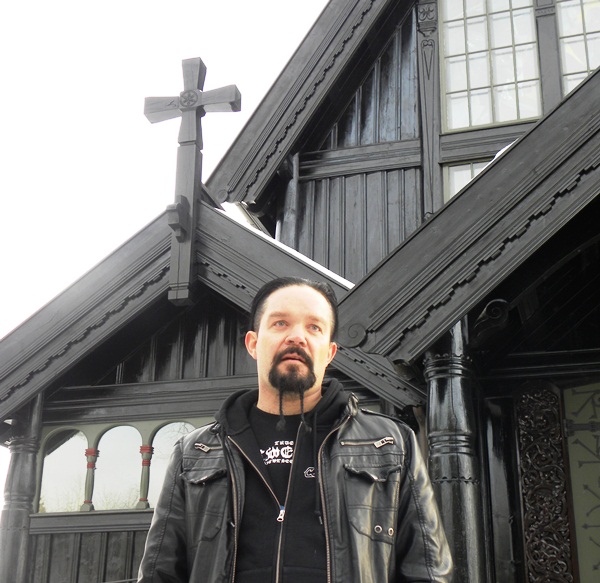 The first stop was the Holmenkollen Chapel, high above Oslo beside the terrifyingly high Holmenkollen ski jump (pictured left, Anders Odden at Holmenkollen Chapel). The church was burnt down in August 1992. Vikernes was found guilty of the arson in 1994. A dry and wryly funny host, Odden was at pains to point out that Oslo’s black metal scene included only five or six people in 1991. It couldn’t really have had too many as Euronymous didn’t want Mayhem’s music circulated amongst the wrong people, and made customers at his record shop Helvete (Hell) fill a suitability questionnaire and then sign a contract when buying albums. Pre-internet, he was able to exert control. Odden said the scene was based around swapping cassettes.
The first stop was the Holmenkollen Chapel, high above Oslo beside the terrifyingly high Holmenkollen ski jump (pictured left, Anders Odden at Holmenkollen Chapel). The church was burnt down in August 1992. Vikernes was found guilty of the arson in 1994. A dry and wryly funny host, Odden was at pains to point out that Oslo’s black metal scene included only five or six people in 1991. It couldn’t really have had too many as Euronymous didn’t want Mayhem’s music circulated amongst the wrong people, and made customers at his record shop Helvete (Hell) fill a suitability questionnaire and then sign a contract when buying albums. Pre-internet, he was able to exert control. Odden said the scene was based around swapping cassettes.
Now rebuilt, Holmenkollen Chapel was one of 11 Norwegian churches that burnt down in 1992. Odden said four were razed “by natural causes”. The rest were destroyed by black metallers.
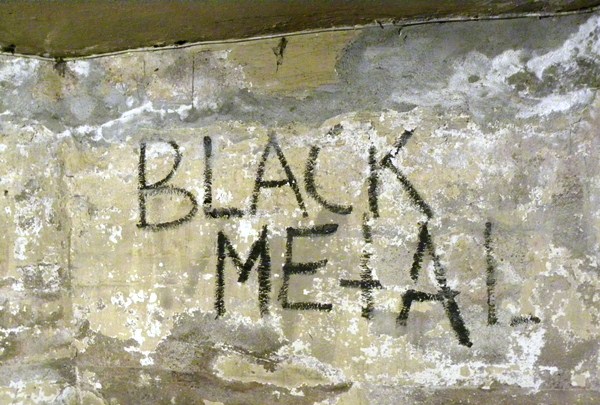 The scene centred on Helvete, on the east side of Oslo, in a formerly run-down area that’s become spiffed up. The shop closed on 1993 and is now a very pleasant café, with cinnamon buns, croissants and strong coffee on offer. Underneath it, though, is a chilling remnant of its former life. Go down a narrow stair round the back and, after winding through pokey, low-ceilinged corridors, you end up in a room with the words “Black Metal” daubed on one wall - the 1982 Venom album title that inspired all that followed. It was painted there by Euronymous. Undoubtedly, it’s one of Norway’s musical monuments. But not one that inspires warmth. This didn't stop one of the tour party asking Odden how many times Euronymous was stabbed by Vikernes.
The scene centred on Helvete, on the east side of Oslo, in a formerly run-down area that’s become spiffed up. The shop closed on 1993 and is now a very pleasant café, with cinnamon buns, croissants and strong coffee on offer. Underneath it, though, is a chilling remnant of its former life. Go down a narrow stair round the back and, after winding through pokey, low-ceilinged corridors, you end up in a room with the words “Black Metal” daubed on one wall - the 1982 Venom album title that inspired all that followed. It was painted there by Euronymous. Undoubtedly, it’s one of Norway’s musical monuments. But not one that inspires warmth. This didn't stop one of the tour party asking Odden how many times Euronymous was stabbed by Vikernes.
Thankfully, thoughts of the day before’s onstage Q&A by the legendary drummer Tony Allen helped temper this nastiness. Most recently, he's been doing time in The Good, the Bad and the Queen alongside Damon Albarn, Paul Simonon and Simon Tong. Further back, as Fela Kuti's drummer he helped create Afrobeat. He wasn’t playing live, and was brought to the festival solely for the talk. Born in 1930, he said he discovered music when he was 17, and listened to “a lot of Blue Note, Art Blakey and the Jazz Messengers. I tried to play like Gene Krupa, I decided to imitate Art Blakey's approach. I copied the Americans for a while, then I found my style. My four limbs are doing four different things at the same time”.
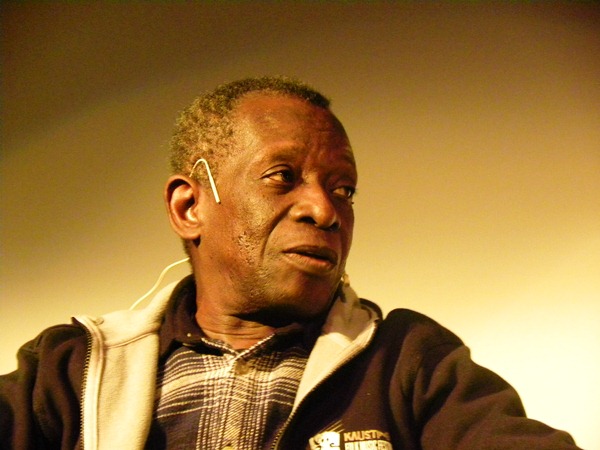 Turning to today’s state of play, Allen (pictured left) said declining revenues are “not going to make me change my job. If you have a hit, you’re lucky. Whereas today it’s only the music that’s there. Making music by machine, selling music by machines. It spreads the music faster, but the risk is there [that there’s nothing else]”. On Fela Kuti, he admitted the bandleader “would not do anything I asked. We tried to play funk, rock, jazz, reggae. When it was called Highlife Jazz, that didn’t mean anything to anybody; a promoter looked for a name for the music. But Afrobeat is not one particular style. Fela was never looking for a particular beat.”
Turning to today’s state of play, Allen (pictured left) said declining revenues are “not going to make me change my job. If you have a hit, you’re lucky. Whereas today it’s only the music that’s there. Making music by machine, selling music by machines. It spreads the music faster, but the risk is there [that there’s nothing else]”. On Fela Kuti, he admitted the bandleader “would not do anything I asked. We tried to play funk, rock, jazz, reggae. When it was called Highlife Jazz, that didn’t mean anything to anybody; a promoter looked for a name for the music. But Afrobeat is not one particular style. Fela was never looking for a particular beat.”
Out in Oslo’s streets, it was equally impossible to define by:Larm by a particular beat. Big names battled it out with knowns, semi-knowns and unknowns. Over four nights, 20 venues hosted 157 shows. Norway held the balance (105), but acts from Denmark, Finland, Iceland and Sweden were on show too. Denmark’s fuzz-filled romanticists The Raveonettes have the longest staying power behind them, but Casiokids (Norway), I Break Horses (Sweden) and GusGus (Iceland) set the bar high.
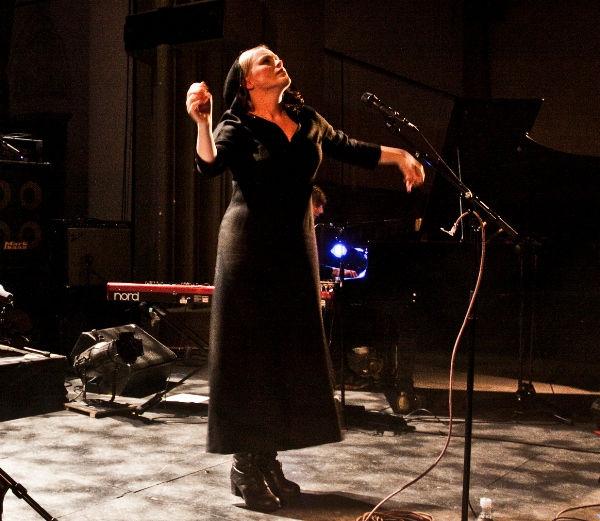 Ane Brun played the red-brick Kulturkirken Jakob (pictured right. Photo by Carina Musk Andersen). Drawing from her recent It All Starts With One album, she turned in a show emphasising how much she has changed recently. Assured and powerful, she’s at a peak song-wise and performance-wise. GusGus were showcasing a reconfigured line-up with singer Högni Egilsson on loan from Hjaltalín. Casiokids played a partisan audience and could have just stood there. They didn’t. More intriguing was how I Break Horses would translate their studio-created post-shoegaze shimmer for the stage. No problems with that.
Ane Brun played the red-brick Kulturkirken Jakob (pictured right. Photo by Carina Musk Andersen). Drawing from her recent It All Starts With One album, she turned in a show emphasising how much she has changed recently. Assured and powerful, she’s at a peak song-wise and performance-wise. GusGus were showcasing a reconfigured line-up with singer Högni Egilsson on loan from Hjaltalín. Casiokids played a partisan audience and could have just stood there. They didn’t. More intriguing was how I Break Horses would translate their studio-created post-shoegaze shimmer for the stage. No problems with that.
Lower down the awareness scale, Finland’s intense Siinai mesmerised. At least they did at small bar Mono. The day before, at the soulless Rockefeller Annex, their sound failed to coagulate in what felt like the corridor of an underground station. Although it’s another difficult venue, the Nokia-Tent – a white tent – hosted some memorable shows, the standout being Norway’s Honningbarna playing for the first time since the death of their drummer in a car crash two weeks previously. A strange, yet powerful, band, they’re young with the touch of early Eighties LA hardcore, but filtered through prog rock. Before them, Rumble in Rodos pulled off the neat trick of melding Sister/Daydream Nation-era Sonic Youth with Arcade Fire, then topping it with falsetto (male) vocals. Better than it sounds.
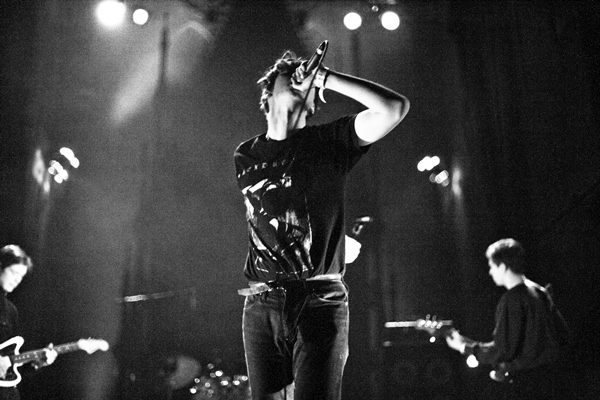 More subtle, also in the tent, were Sweden’s The Amazing, a band formed by members of indie band Granada and the psychedelic Dungen. Terrific, their mellow drift evoked canyons and glistening rivers. Not mellow and also not drifting were Denmark’s Iceage (pictured left. Photo by Helge Brekke), a band on the cusp of worldwide recognition. Bouncing on stage, they're like a pack of angry, scowling lambs. Their punk guitar is ladled onto a Gang Of Four scratchiness with wild effectiveness. But they are mono-dimensional. Don’t reflect and they’re fine.
More subtle, also in the tent, were Sweden’s The Amazing, a band formed by members of indie band Granada and the psychedelic Dungen. Terrific, their mellow drift evoked canyons and glistening rivers. Not mellow and also not drifting were Denmark’s Iceage (pictured left. Photo by Helge Brekke), a band on the cusp of worldwide recognition. Bouncing on stage, they're like a pack of angry, scowling lambs. Their punk guitar is ladled onto a Gang Of Four scratchiness with wild effectiveness. But they are mono-dimensional. Don’t reflect and they’re fine.
As intense, but at the outer edges of experimentation, Finland’s Jarse (yar-sa) are an off-shoot of the instrumental outfit Shogun Kunitoki. Repetitive, almost hymnal, keyboard refrains were bedded with drums and spidery guitar like a militaristic vision of Eno’s Another Green World. It was impossible not to be sucked in.
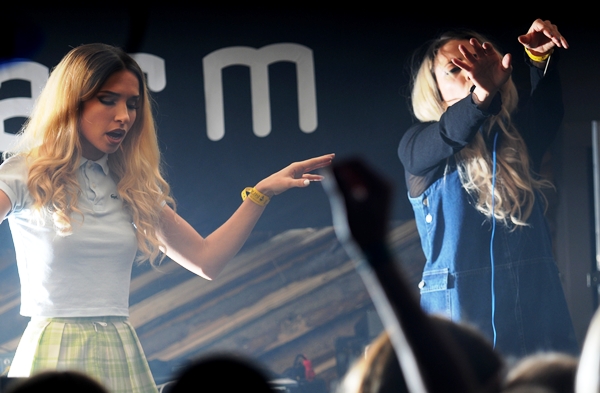 Jarse’s tangential approach underlines that by:Larm is swamped with music springing from the familiar, but it's the more idiosyncratic and more off-the-wall that stand out. That meant jazz trio Moskus, playing the beautiful venue Victoria, wove patterns that enfolded. It also meant the bonkers Swedish duo Rebecca & Fiona stood out big time (pictured right. Photo by Thomas Karlsen). Bouncing up and down to their tracks, they twiddle console knobs and purvey an endless Ibiza/Cascada Euro-electro dance that’s archly simple-minded. Hilarious. Stuck in front of a rock audience, one of them said, “Thank you, Oslo, this is a bit awkward”.
Jarse’s tangential approach underlines that by:Larm is swamped with music springing from the familiar, but it's the more idiosyncratic and more off-the-wall that stand out. That meant jazz trio Moskus, playing the beautiful venue Victoria, wove patterns that enfolded. It also meant the bonkers Swedish duo Rebecca & Fiona stood out big time (pictured right. Photo by Thomas Karlsen). Bouncing up and down to their tracks, they twiddle console knobs and purvey an endless Ibiza/Cascada Euro-electro dance that’s archly simple-minded. Hilarious. Stuck in front of a rock audience, one of them said, “Thank you, Oslo, this is a bit awkward”.
But the standout was Hedvig Mollestad Trio. Their album Shoot! intrigued, with its melange of Led Zeppelin rock and jazz. It wasn't jazz rock or even fusion, but a mostly instrumental rock that borrowed a tendency for tempo shifting from jazz. Live, it was extraordinary. Mollestad is a guitarist of rare economy, playing nothing more than needed, but still packing in twists, turns and unexpected detours. Extremely heavy, she perfectly knitted with spare drumming and a double bass grounding. A consummate performance, it showed musical skill doesn’t stifle creativity. Turning around, I saw people standing with their mouths hanging open. Incredible.
By:Larm 2012 was overwhelming. It was bigger than ever. Opportunities were no doubt missed. It was impossible to see everything, or even part of everything. But you have to wonder – whatever the appalling history - what would Mayhem’s Euronymous have made of the festival? He strove to vet the people who bought his records. They’re still selling, no doubt to people he wouldn’t have approved of. He couldn’t have ignored the internet, but would he have turned his back on an opportunity to be part of celebration of Nordic music’s current landscape? You sense he would have, just to make the point that you don’t have to sell. Yet, however you see it, nothing can be kept under wraps any more, meaning by:Larm accommodates it all, from the strange, weird or challenging to the comfortingly familiar.
Buy
Explore topics
Share this article
more New music
 Album: Pet Shop Boys - Nonetheless
Longing, love and longevity as the duo resolutely refuse retirement
Album: Pet Shop Boys - Nonetheless
Longing, love and longevity as the duo resolutely refuse retirement
 Album: Mdou Moctar - Funeral for Justice
Tuareg rockers are on fiery form
Album: Mdou Moctar - Funeral for Justice
Tuareg rockers are on fiery form
 Album: Fred Hersch - Silent, Listening
A 'nocturnal' album - or is it just plain dark?
Album: Fred Hersch - Silent, Listening
A 'nocturnal' album - or is it just plain dark?
 Music Reissues Weekly: Linda Smith - I So Liked Spring, Nothing Else Matters
The reappearance of two obscure - and great - albums by the American musical auteur
Music Reissues Weekly: Linda Smith - I So Liked Spring, Nothing Else Matters
The reappearance of two obscure - and great - albums by the American musical auteur
 The Songs of Joni Mitchell, Roundhouse review - fans (old and new) toast to an icon of our age
A stellar line up of artists reimagine some of Mitchell’s most magnificent works
The Songs of Joni Mitchell, Roundhouse review - fans (old and new) toast to an icon of our age
A stellar line up of artists reimagine some of Mitchell’s most magnificent works
 Album: Taylor Swift - The Tortured Poets Department: The Anthology
Taylor Swift bares her soul with a 31-track double album
Album: Taylor Swift - The Tortured Poets Department: The Anthology
Taylor Swift bares her soul with a 31-track double album
 Album: Jonny Drop • Andrew Ashong - The Puzzle Dust
Bottled sunshine from a Brit soul-jazz team-up
Album: Jonny Drop • Andrew Ashong - The Puzzle Dust
Bottled sunshine from a Brit soul-jazz team-up
 theartsdesk on Vinyl: Record Store Day Special 2024
Annual edition checking out records exclusively available on this year's Record Store Day
theartsdesk on Vinyl: Record Store Day Special 2024
Annual edition checking out records exclusively available on this year's Record Store Day
 Album: Pearl Jam - Dark Matter
Enduring grunge icons return full of energy, arguably their most empowered yet
Album: Pearl Jam - Dark Matter
Enduring grunge icons return full of energy, arguably their most empowered yet
 Album: Paraorchestra with Brett Anderson and Charles Hazlewood - Death Songbook
An uneven voyage into darkness
Album: Paraorchestra with Brett Anderson and Charles Hazlewood - Death Songbook
An uneven voyage into darkness
 theartsdesk on Vinyl 83: Deep Purple, Annie Anxiety, Ghetts, WHAM!, Kaiser Chiefs, Butthole Surfers and more
The most wide-ranging regular record reviews in this galaxy
theartsdesk on Vinyl 83: Deep Purple, Annie Anxiety, Ghetts, WHAM!, Kaiser Chiefs, Butthole Surfers and more
The most wide-ranging regular record reviews in this galaxy
 Album: EMEL - MRA
Tunisian-American singer's latest is fired with feminism and global electro-pop maximalism
Album: EMEL - MRA
Tunisian-American singer's latest is fired with feminism and global electro-pop maximalism

Add comment